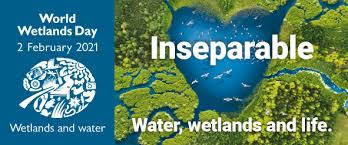Wetlands sustain life. Wetlands protect life. The day of adoption of Ramsar Convention protecting wetlands, February 2nd, has since been celebrated as " World Wetlands Day." The 2021 theme is Water and Wetlands both vital for survival and both used up as urban centres sprawl to take up what used to be vital wetlands that have sustained life and livelihoods for centuries.
According to the Ramsar Convention, the inclusive definition of Wetlands is as follows:
“…wetlands are areas of marsh, fen, peatland or water, whether natural or artificial, permanent or temporary, with water that is static or flowing, fresh, brackish or salt, including areas of marine water the depth of which at low tide does not exceed six metres."
This inclusive definition is important in the quest to protect what's left of the wetlands - these teeming biodiversity hotspots because so many cities - metros and capitals have been built on or around what used to be massive wetland systems.
Dismissed as "swamps," drained of water and later pumped full of concrete our "urban planners" of the past have created water scarce cities that are ironically flood prone as well. As the cooling water, flora and fauna of the marshes were replaced by concrete cities urban heat islands flourished negating the wetland carbon sinks and adding to global warming and the climate emergency.
Last year, the Ramsar-Bonn connect was highlighted just before the pandemic ground the world world to a halt, at the 13th conference of parties to the Bonn Convention of migratory species of wild animals, hosted in India: 10 wetlands across India were designated Ramsar sites or "wetland sites of international importance."
Hopefully as the powers that be commit to sustainable development, our wetlands will be protected and future cities will all be sustainable cities not just "smart cities." Wetlands and water are inseparable and if we are to tackle the climate crisis we need to put protecting wetlands at the heart of climate action.
Wetlands are water reservoirs, natural flood prevention, vital carbon sinks as well as sustaining a vast array of biodiversity. Urbanization is an inevitable consequence of modernization but if mankind is to survive our cities shouldn't grow at the cost of wetlands. Another consequence of urbanization and modernization is the growing plastic crisis - plastic waste is as dangerous to the health and survival of wetlands as marine plastic is to oceans. But, there are many efforts underway to remove plastics and landfills from our wetlands as well as efforts to stop plastic from ending up in wetlands in the first place.
Wetlands are the final defense against the intensified flood-drought cycle caused by climate change. Cities running out of water is an ever-recurring crisis across the planet and wetlands, as shown in Kolkata and Kochi, can be vital in ensuring water security and SDG 6 (Clean water and sanitation) in cities. After the Chennai Floods back in 2015 and the Vardah Cyclone the following year, many people saw first hand how fast the Pallikarnai Marsh absorbed flood waters, yet we continue to encroach upon it with concrete and garbage to expand this already water-starved flood-prone city of Chennai.
Protecting wetlands is ensuring water security and water security spells human security. Thus it is in the interest of mankind to SAVE THE WETLANDS!







No comments:
Post a Comment